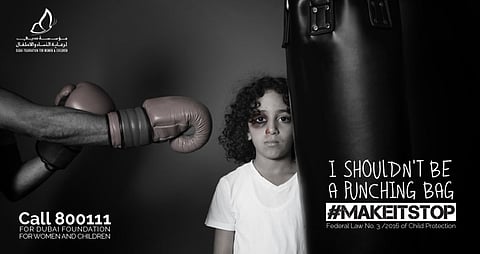Campaign raises awareness of impact of child abuse
Damage caused by child abuse can last a life-time, campaign warns

Dubai
An ongoing campaign by the Dubai Foundation for Women and Children (DFWAC) in April is conveying a strong message about child abuse and the impact it can have on the future psychological well-being of children.
With April being the international month for child abuse prevention, the foundation has taken a step to further combat the problem and warn of the serious impact it can have on children who are subjected to violence without access to rehabilitation programmes, an official from DFWAC has said.
Mariam Bin Thaneya, Communication Director at DFWAC said that the launch of their eighth annual campaign ‘Protect My Childhood, It’s Precious’ is targeting the largest number of people in the community and is addressing the five main kinds of abuse — physical, verbal, neglect, health and sexual.
“Child abuse needs to be taken more seriously as it is the root of all evil and individuals need to acknowledge that the damage it causes lasts a lifetime and affects the person you are today,” she said.
She added that abuse may not leave visible scars, but it mainly damages the child’s psychological well-being. “It takes a moment for a child to get injured, but the regret and guilt will last a long time and is difficult to overcome.”
The campaign this year focuses on educating children and adults about child abuse through awareness visuals found at malls, Enoc petrol pumps, cinema screenings, in addition to messages shared on social media platforms along with the hashtag #MakeItStop.
Bin Thaneya, said awareness videos are helping deliver the message easily to different groups in Arabic and English. “The campaign’s digital visuals, along with its awareness messages, helps encourage people to use the 800111 helpline to report any cases of child abuse, or seek counselling.”
In 2016, the foundation received 62 victims of child abuse, of which 34 were internal cases and 28 external cases. The children were between the ages of one day to 16 years. While in 2015, the foundation had received 69 victims, of which 41 were internal cases and 28 external cases.
“In most of these cases, the abuser has been the father followed by the mother,” Bin Thaneya said. “The cases had been reported to the foundation by police, relatives and schools. These children have mostly experienced emotional/verbal abuse, neglect, deprivation, and have witnessed domestic violence on various occasions.”
Many children remain silent about their exposure to violence either because of their fear of the abuser or thinking that it is normal when the source of abuse is the father or the mother. DFWAC wants to reach the victims of child abuse who do not report that they are being abused for various reasons.
“We have organised various targeted workshops and lectures for children, parents and educators in other emirates,” she added.
Efforts to stem child abuse in Dubai are producing results, however the number of child abuse cases continue to fluctuate each year “which is normal in a country which attracts thousands of new people from all over the world each year,” she said. Bin Thaneya said DFWAC provides free services to women and children victims of violence, including a helpline, safe shelter, case management, medical care, psychological support, counselling, legal, consular and immigration assistance.
Sign up for the Daily Briefing
Get the latest news and updates straight to your inbox



